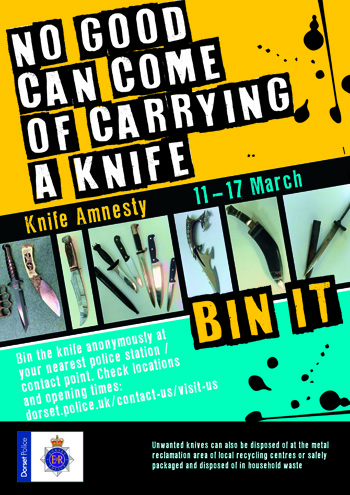From 11 – 17 March people in Dorset can dispose of unwanted knives and bladed items at designated police stations without fear of prosecution.
Please check online for locations and opening times before you make your journey as not all are open seven days a week: www.dorset.police.uk/contact-is/visit-us
Knives of any description can be disposed of, including illegal lock knives and “zombie” knives, samurai swords, kitchen knives, unwanted collectables, replicas and ceremonial items.
Dorset Police is supporting the amnesty as part of the ongoing national Operation Sceptre which has the aims of combating knife crime and raising awareness about it.
Knives can be anonymously disposed of in secure bins at Weymouth, Poole, Bournemouth and Blandford police stations.
Superintendent Jared Parkin said: “Here in Dorset we do not have the extent of knife crime reported in some major metropolitan areas of the country. Carrying of knives by young people is not endemic in our policing area, and instead tends to be associated with criminal gang activity such as county lines drugs supply which is already actively targeted.
“We are holding the knife amnesty as part of our ongoing local approach to focussing upon prevention. Any knife taken out of circulation and off the street helps to prevent injuries and deaths.
“Carrying a knife is illegal and incredibly dangerous. People who carry knives for no good reason risk arrest and the notion of self-defence is not a good reason. If a knife is used in a confrontation the balance of probability is that the person carrying it is more likely to be injured from it themselves.”
The maximum penalty for an adult carrying a knife is four years in prison and an unlimited fine. You’ll get a prison sentence if you’re convicted of carrying a knife more than once.
The Police & Crime Commissioner for Dorset, Martyn Underhill said: “The devastating impact of knife violence on urban communities is becoming apparent in other parts of the country. Dorset does not have a problem with knife crime on a scale even close to that which has recently been featured in the national media, and which is now the focus of government attention, but by the same token, we cannot afford to be complacent.
‘’County lines, the criminal supply of drugs from metropolitan gangs to rural areas, has had a significant impact on the crime statistics in the area. Partially this is due to better recording procedures, but we must concede that knife crime has sadly gone up in the last year due to its habitual association with such criminal activity.
“Dorset Police is already targeting those who are known to carry knives and continue to prosecute offenders to the full extent of the law. Knife amnesties are a vital tool in removing knives from our streets and they will continue across Dorset.
“Education and early intervention in schools is happening too in order to explain the dangers and consequences of carrying a knife. We must continue to raise awareness, keep talking about the problem and work with our partners across Dorset to tackle this issue together. Knife crime goes beyond policing. It’s a public health issue. It’s an education issue. It’s an attitude issue. Above all, it’s a community issue, so let’s all get involved in the conversation.”
The law on knives, banned weapons and legitimate reasons for carrying a knife can be found on the Government’s website here: www.gov.uk/buying-carrying-knives











